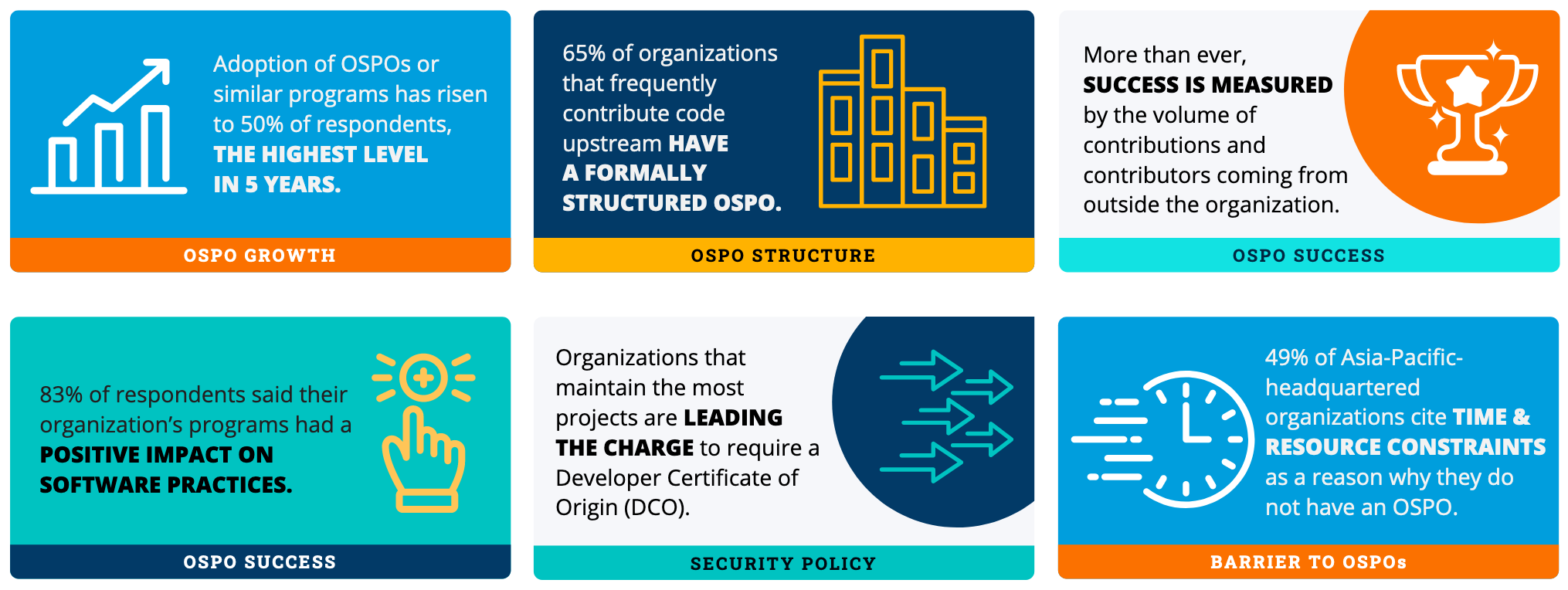The TODO Group is proud to announce the fifth annual Open Source Program Management Survey results that examines the prevalence and outcomes of open source programs, including the key benefits and barriers to adoption worldwide. We have open sourced all of our survey results, raw data and graphics in the dedicated repo.
People can also download the report as PDF
🚀 Key Findings

More Structured OSPOs
Adoption of OSPOs or similar programs has risen to 50%, the highest level in 5 years. Professionalization continues among OSPOs, as 60% of the programs are formally structured with dedicated person-hours,reporting structure and/or job titles structured, up from 54% two years ago.
OSPO Benefits
Software practices continue to see gains. Climbing to the highest level in the study’s history, 83% of respondents said their organizations programs had a positive impact software practices.
Open source is the life-blood for many of the small businesses represented in this study. OSPOs continue to be seen as extremely or very critical to the success engineering or product teams. However, respondents at organizations with less than 50 employees are twice as likely to believe the efforts are extremely critical as compared to those at organizations with 1,000 or more employees.
Increased influence in open source communities rose several places to become #2 on the list of areas where organizations have benefited most from OSPOs. Increased innovation fell to #4 but continues to be the top benefit among organizations with less than 10 employees.
Big Organizations Stand Apart
- OSPOs at organizations with more than 20,000 employees continue to stand apart. They represent 47% of all the formally structured OSPOs in the study.License compliance and general awareness and use of open source dependencies are the top ways they benefit from OSPOs.
Organizations Without an Open SourceProgram or Initiative
- There is an opportunity to create new OSPOs in the Asia-Pacific region. Half of the participants without plans for an OSPO think it would benefit their company.
European Organizations
European-headquartered organizations are often not training, recruiting and hiring developers to work on open source projects. For example, 44% of European organizations never recruit or hire developers to work on open source projects vs the study average of 27%.
Asia-Pacific Organizations
51% of respondents at Asia-Pacific organization believe an OSPO would be beneficial as compared to 35% of those based in North America. Recruiting and retaining developer talent is the top challenge Asia- Pacific organizations face.
Gauging Participation in Open Source Ecosystems
Almost half of the organizations that have an open source program/initiative (46%), regardless of its formality, have reviewed or audited contracts as way to gauge participation in open source ecosystems. That compares to 28% of everyone else.
Along with contracts, open source disclosure documents supplied by third-party vendors can be used to gauge “community citizenship”. However, 55% of the study did not know if their organization collects, verifies, grades and then publicly shares this information. Among those that could answer the question, publicly sharing the findings is even less common.
🙏 Acknowledgements
This report would not have been possible without the contributions of many individuals in our community. In particular, we thank all of our survey partners who provided a combination of both funding and in-kind support to ensure the survey’s translation and widespread distribution, including Vmware, Salesforce, api7.ai, Futurewei, Ovio, X-lab, FINOS, and LF Training and Certification.
We also thank our awesome OSPO practitioners across the TODO community who gave us feedback and ideas to shape the 2022 survey (see individual feedback via OSPO Survey GH repo Issues and PR).
In addition, we thank those open source communities and organizations who willingly distributed the survey, including InnerSource Commons, SustainOSS, LF Energy, Open Forum Europe, and OpenChain.
About TODO Group
The TODO Group is committed to advancing the state of open source program management across the industry and will be performing this survey on an annual basis. We look forward to get community feedback on this survey and how we can improve it in the future.
If you’re interested in starting an open source program or collaborating with your peers in open source program management, please consider joining the TODO Group Community.